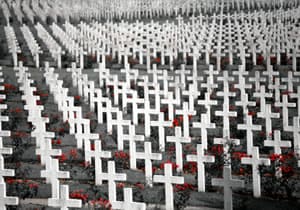Remembering, and longing


I think many of us have mixed feelings on Remembrance Day. Because so many of us struggle with the concept of war, and because it’s harder today to believe that one side in a war is on the side of good, it’s harder to mark this day with the innocence that we used to have as kids on Remembrance Day at 11:00 in our grade school classes.
The real sadness for me is that war makes me long for a time that isn’t yet here. As much as I believe in working toward peace and ending war, I think we’ve learned that this isn’t yet the case, nor will it be until a King reigns who shall “judge between the nations, and shall decide disputes for many peoples; and they shall beat their swords into plowshares, and their spears into pruning hooks; nation shall not lift up sword against nation, neither shall they learn war anymore” (Isaiah 2:4). The peace we long for won’t be realized until then.
Two stories are in my mind though as I mark this Remembrance Day.
The first story is about numbers, but the numbers are staggering. As of September 2008, 98 Canadians have been killed serving in the Afghanistan mission. 98 is a terrible number. But if the casualty rate, as a percentage of the Canadian population, was the same as in World War I, we would be looking at 300,000 soldiers dead and 800,000 injured. I can’t even comprehend the scale of those numbers.
The story of one soldier might be enough:
He was the last man to fall in what was supposed to be the “War to End All Wars.”
Across Europe, civilians were already rejoicing a ceasefire to the bloody conflict as Allied soldiers still stuck in the trenches kept on the heels of retreating enemy troops. Canadian Pte. George Lawrence Price was positioned firmly on the front line as moments counted down toward precious peace.
According to one historian, he rose just briefly to greet the wave of a woman he spotted above. And at 10:58 a.m. — just two minutes before Armistice was officially signed at 11 a.m., Nov. 11, 1918 — the 25-year-old farm labourer was shot in the right chest by a German sniper near the Belgian city of Mons.
At that moment, Price earned the “grim distinction” as the last known Canadian — and likely the last Allied soldier — to die in combat in the First World War.
“He epitomized the sadness, the waste of the Great War and certainly the casualties,” says Tim Cook, an author and World War One historian at the Canadian War Museum.
He died 90 years ago today. Just one story of the 67,000 Canadians killed in World War I.





